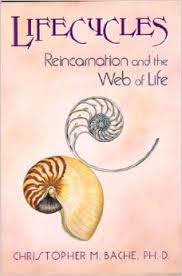 Reviewed by Daniel Kealey, Ph.D.
Reviewed by Daniel Kealey, Ph.D.
In JRT Issue 10, Fall 1992
Dr. Bache, a member of the Department of Philosophy and Religious Studies at Youngstown State University, has written a much needed book full of stimulating insights into the contemporary philosophical implications of reincarnation. He correctly states that the belief in the theory of reincarnation is no longer just a religious question, for the impressive accumulation of evidence that has become part of the contemporary intellectual environment makes it essentially an empirical question. Bache backs up this claim with an overview of the research, focusing primarily on the work of Stevenson and the findings of past-life regression. But this is not his main purpose. He notes that as a teacher he often finds that while students are impressed by the evidence for reincarnation on a case-by-case basis, they are unable to embrace the theory of reincarnation because they lack a comprehensive philosophy that can make sense of the data. It is when he begins to explore the larger philosophical aspects of reincarnation in the third chapter that readers of this journal will find themselves most engaged.
There he explains different interpretations of karma and draws heavily from past-life therapy. He criticizes such simplistic notions of karma as that of mechanistic cause and effect, noting that:
…the creativity and wisdom of karma’s translation of past choices into future lives was far too great to be suitably described by the metaphor of a machine. The dynamics of karma showed an intelligence that was not merely thorough but also exceptionally creative (p. 80).
He confesses that when he first came to accept reincarnation, karma took on many of the duties traditionally ascribed to God, but that later he was forced to conclude that karma, rather than being managed by a single mega-being, was, instead, managed by a hierarchy of intelligences.
In his illuminating chapter on the Oversoul, Bache reveals a little about his own several years’ experience in past-life therapy under the direction of his colleague, Dr. David Cliness of the Counseling Department at Youngstown State University. The deep psyche responds according to the intention by which it is approached. Most past-life therapists approach their work with the intention of healing the present life. Dr. Cliness found, however, that when the psyche is approached in an open-ended way, one’s past lives come forward not only as past but as living realities that can and need to enter into dialogue with us. The therapeutic work, therefore, is not only one-way, but mutual. When one helps past-life personalities through their blocks, they then move on into the bosom of the Oversoul from which they can return as beings of light when needed by the present life personality in subsequent regression sessions. The Oversoul, it appears, is a “We.”
Whether reincarnation is compatible with Christianity or not is another theme pursued by Bache. He disagrees with various reincarnationists who argue that certain biblical passages refer to reincarnation. Bache, who earned his masters degree in New Testament and Early Christian Origins from Cambridge University, takes a conservative view in the interpretation of the passages in question, finding that they can be satisfactorily interpreted along non-reincarnationist lines. But reincarnation is far from incompatible with Christian teaching. He identifies what he perceives as the core principles of Christianity and finds that they do not exclude belief in reincarnation. “Reincarnation enlarges the size of the stage on which the spiritual drama of humankind is performed, but it does not change what Christianity has considered the essential elements of the script.” (p. 162) The Nag Hammadi literature is evidence that at least some early Christians, the Gnostics, believed in reincarnation.
Several chapters are devoted to the explication of a post-existentialist philosophy that draws out the implications of accepting the reincarnation framework. Here the reader is treated not only to the big picture, but also to practical guidelines on how to play the game of life.
There are at least four reasons why I am happy to see this book in print: First, Bache packages the wide-ranging phenomena of reincarnation into an elegant but sophisticated philosophical overview. Second, he provides the teachers amongst us with wonderful explanations and diagrams that will make our pedagogical efforts more effective. Third, he introduces us to the pioneering past-life therapy work of Dr. David Cliness. And, finally, that this book is written by an academic is, I hope, a sign that holistic and transpersonal-oriented academics can begin to come out of the closet and express their views more forthrightly.
